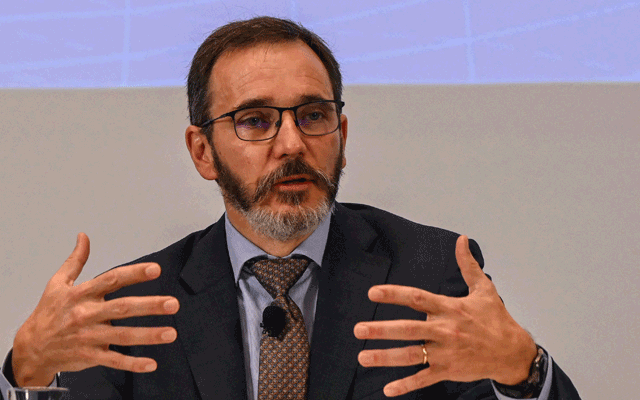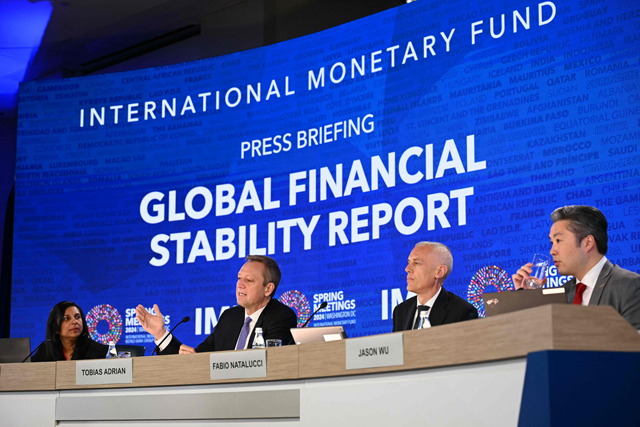You are here
IMF nudges up 2023 economic outlook but warns of slowing global growth ahead
By AFP - Jul 25,2023 - Last updated at Jul 25,2023

International Monetary Fund (IMF) Division Chief of the Research Department Daniel Leigh; IMF Deputy Director of the Research Department Petya Koeva Brooks; and IMF chief economist, Pierre-Olivier Gourinchas participate in a news conference on the IMF release of the World Economic Outlook Update, at IMF headquarters in Washington, DC, on Tuesday (AFP photo)
WASHINGTON — The International Monetary Fund (IMF) has slightly upgraded its outlook for global growth this year on the back of resilient service sector activity in the first quarter and a strong labour market, the lender said Tuesday.
But despite the mildly better economic outlook, global growth is expected to slow to 3 per cent this year and then stay there, held down by weak growth among the world's advanced economies, the IMF announced in a new report.
"We're not out of the woods yet and growth remains on the low side," IMF Chief Economist Pierre-Olivier Gourinchas told AFP in an interview ahead of the report's publication.
The global growth forecast for this year was raised by 0.2 percentage points from the IMF's last forecast in April, putting the world economy on track for three per cent growth in both 2023 and 2024.
This is down from global economic growth of 6.3 per cent in 2021, and 3.5 per cent last year, the IMF announced in its update to the World Economic Outlook (WEO).
The IMF published its lowest medium-term forecast since the 1990s, citing slowing population growth and the end of the era of economic catch-up by several countries including China and South Korea.
On Tuesday, the IMF said the global inflation picture has improved somewhat, with consumer prices now forecast to increase by 6.8 per cent this year, down 0.2 percentage points from the previous forecast in April.
This is "largely on account of subdued inflation in China," the IMF said, adding that global inflation remains well above its pre-pandemic levels of around 3.5 per cent.
'Resilient' US consumption
The IMF has lifted its outlook for US growth this year to 1.8 per cent, up 0.2 percentage points from April, citing "resilient consumption growth in the first quarter".
The still-tight labour market in the world's largest economy "has supported gains in real income and a rebound in vehicle purchases", the IMF said in its report.
The fund sees US growth slipping to 1 per cent next year, as savings accumulated during the pandemic dry up and the economy loses momentum.
"We are cautiously prudent that the US economy could avoid a recession and, you know, glide towards its inflation target without having a recession in its future," Gourinchas told AFP.
"But it's a very, very narrow path," he added.
Asian economies still dominate
As with the April forecast, much of the global growth this year is forecast to come from emerging market and developing economies (EMDEs) like India and China, with economic activity in advanced economies predicted to slow substantially this year and next.
Advanced economies are now forecast to grow by 1.5 per cent this year, up 0.2 per centage points from April, and by 1.4 per cent in 2024.
Citing positive recent economic news from the United Kingdom, the IMF has lifted the country's forecast for 2023 growth to 0.4 per cent, leaving Germany as the only G7 economy expected to contract this year.
The news is much more positive among the EMDEs, which are forecast to grow by 4 per cent this year, and by 4.1 per cent next year.
The IMF's 2023 growth forecast for China remained unchanged at 5.2 per cent, although it notes there has been a change in composition due to the underperformance of investment due to the country's troubled real estate sector.
Alongside weakness in the real estate sector, the IMF said foreign demand remains weak and warned of rising and elevated youth unemployment, which reached almost 21 per cent in May.
The IMF lifted India's 2023 growth prospects to 6.1 per cent, up 0.2 percentage points from April, citing "momentum from stronger-than-expected growth in the fourth quarter of 2022 as a result of stronger domestic investment."
The fund now expects Russia's economy to grow by 1.5 per cent this year, an upward revision of 0.8 per centage points from April, due to stronger-than-expected economic data fueled by "a large fiscal stimulus".
Related Articles
WASHINGTON — Global growth is set to be higher than expected this year, the IMF said on Monday, raising its forecast on surprisingly strong
WASHINGTON — Surging inflation and severe slowdowns in the United States and China prompted the International Monetary Fund (IMF) to downgra
WASHINGTON — The International Monetary Fund (IMF) has raised its outlook for the global economy this year, while maintaining a gloomy forec



















